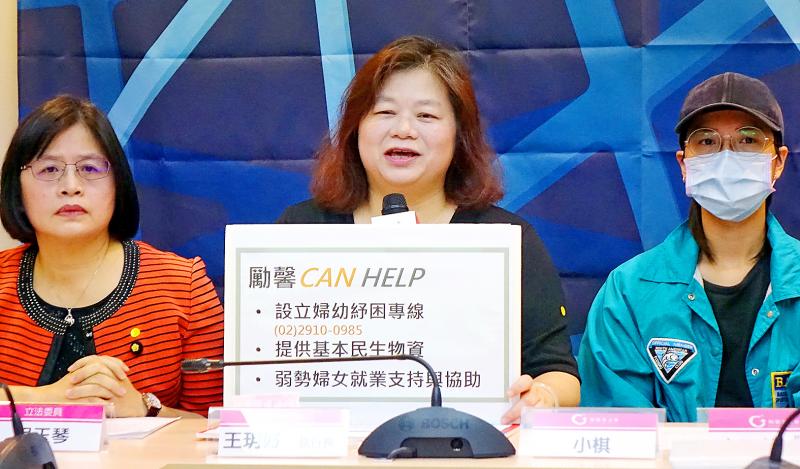The Garden of Hope Foundation yesterday called on the government to ease COVID-19 relief requirements, saying that many women and children who live separately from the family members listed on their household registration due to sexual abuse, domestic violence or other reasons might be unable to access relief.
From January to March, about 32,000 cases of domestic violence were reported in the nation, up about 5 percent compared with the same period last year, the foundation told a news conference in Taipei, citing Ministry of Health and Welfare statistics.
The foundation said that since the COVID-19 pandemic began, it has observed from its work with victims of violence an increase in family conflicts caused by economic pressure — a trend it says is happening worldwide.

Photo: Chu Pei-hsiung, Taipei Times
The UN has called the rise in domestic violence a “shadow pandemic,” the foundation said, adding that COVID-19 has put already vulnerable people at greater risk.
The foundation said that the women and children it serves encounter several obstacles when they try to apply for government relief.
Due to domestic violence, sexual abuse or negligent care, many of the children and young people the foundation serves left their homes at an early age and live independently, but people under the age of 20 cannot apply for relief, it said.
New immigrants who have left their homes because of domestic violence but have not yet received their national ID cards also cannot apply, it said.
Most of those immigrants work in the service or food industries and have been greatly affected by the pandemic, but because they do not have national ID cards, they have been excluded from the government’s relief programs, it said.
Meanwhile, if someone listed on a household registration has already filed an application for relief, then the others on that registration cannot apply, it said.
While social welfare in Taiwan is traditionally distributed to households as a unit, it can be difficult for victims of domestic violence or sexual abuse at home to explain their situation to administrative staff at local township offices, foundation CEO Wang Yue-hao (王玥好) said.
Democratic Progressive Party Legislator Wu Yu-chin (吳玉琴) and New Power Party Legislator Chiu Hsien-chih (邱顯智) yesterday also attended the news conference in support of the foundation and the issues it raised.
Urging the government to listen to non-governmental organizations that have long supported disadvantaged groups, Chiu said that the opinions expressed by the foundation are valuable because they are based on its experience working on the front lines with vulnerable people.
Victims of domestic violence and their abusers have a “conflict of interest” under the current relief scheme, which treats households — as opposed to individuals — as applicants, he said.
While it is understandable that the government might have initially been unable to account for all the different situations that could arise, now that it has been made aware, it should respond, he said.

South Korean K-pop girl group Blackpink are to make Kaohsiung the first stop on their Asia tour when they perform at Kaohsiung National Stadium on Oct. 18 and 19, the event organizer said yesterday. The upcoming performances will also make Blackpink the first girl group ever to perform twice at the stadium. It will be the group’s third visit to Taiwan to stage a concert. The last time Blackpink held a concert in the city was in March 2023. Their first concert in Taiwan was on March 3, 2019, at NTSU Arena (Linkou Arena). The group’s 2022-2023 “Born Pink” tour set a

CPBL players, cheerleaders and officials pose at a news conference in Taipei yesterday announcing the upcoming All-Star Game. This year’s CPBL All-Star Weekend is to be held at the Taipei Dome on July 19 and 20.

The Taiwan High Court yesterday upheld a lower court’s decision that ruled in favor of former president Tsai Ing-wen (蔡英文) regarding the legitimacy of her doctoral degree. The issue surrounding Tsai’s academic credentials was raised by former political talk show host Dennis Peng (彭文正) in a Facebook post in June 2019, when Tsai was seeking re-election. Peng has repeatedly accused Tsai of never completing her doctoral dissertation to get a doctoral degree in law from the London School of Economics and Political Science (LSE) in 1984. He subsequently filed a declaratory action charging that

The Hualien Branch of the High Court today sentenced the main suspect in the 2021 fatal derailment of the Taroko Express to 12 years and six months in jail in the second trial of the suspect for his role in Taiwan’s deadliest train crash. Lee Yi-hsiang (李義祥), the driver of a crane truck that fell onto the tracks and which the the Taiwan Railways Administration's (TRA) train crashed into in an accident that killed 49 people and injured 200, was sentenced to seven years and 10 months in the first trial by the Hualien District Court in 2022. Hoa Van Hao, a